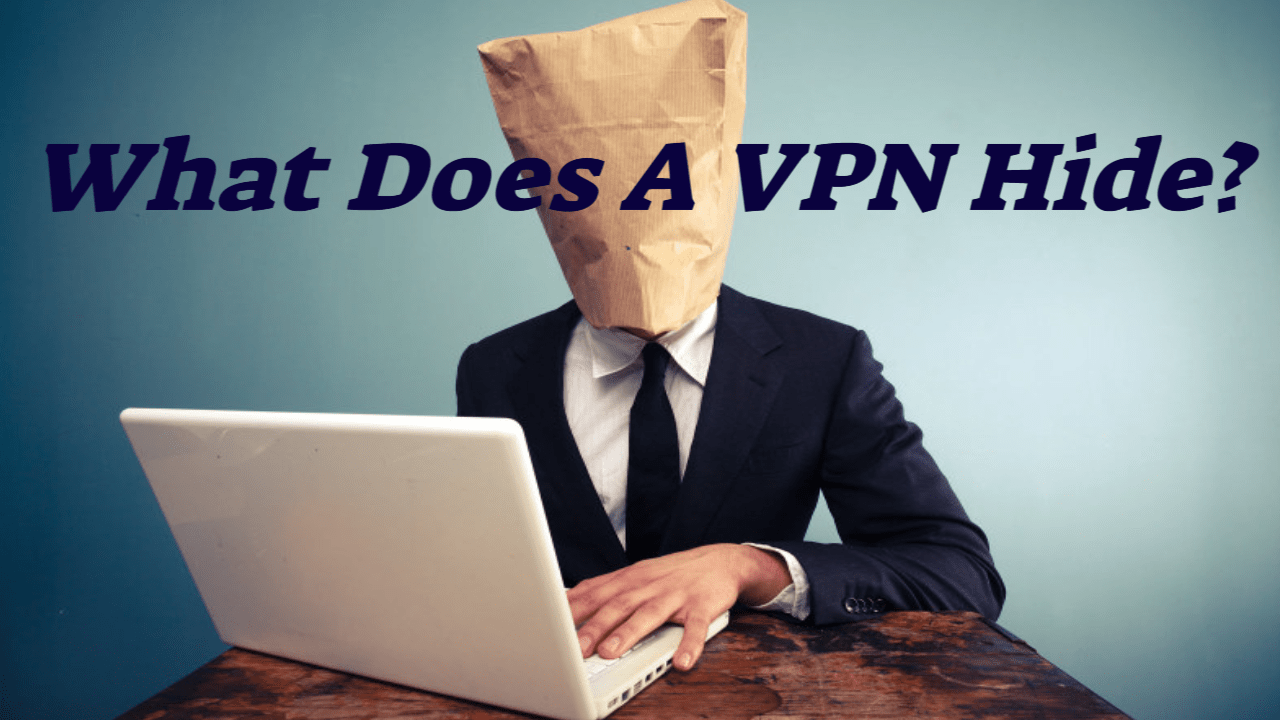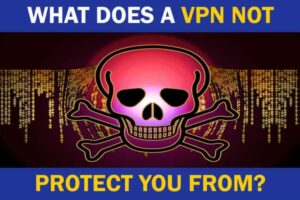What Does a VPN Hide? – Let’s Find Out
The majority of people are concerned about their internet privacy, but they have no understanding of what a VPN conceals.
Fortunately, a virtual private network (VPN) may assist you in remaining concealed and obscure while browsing the internet, keeping you safe and secure online.
None of your internet actions are encrypted by default. You leave a digital footprint when you utilize online internet services, such as browsing history, cookies, and cached data. As a result, by using a VPN, you can hide all of your tracks.
You may believe that removing your browser’s cookies and search history is the simplest approach to hiding your search history, however, this is not the case. Because ISPs maintain track of which websites are visited, anyone with the necessary technical abilities may recover deleted browser history from the DNS cache.
Last year, direct cybercrime is estimated to have cost more than $600 billion. With this in mind, you must safeguard your work from third-party risks such as governments and hackers.
Let’s face it: being cautious about security is critical in today’s internet environment.
When you enable a VPN, you will enjoy online privacy and security by masking your online identity. Third parties will only be able to see the IP address of the remote VPN if your web traffic and internet traffic are encrypted. Because it’s encrypted, they can’t access your personal information, location, or browsing history.
A VPN can readily disguise a variety of things. So let’s get right to the point: ‘What does a VPN hide?’
Your VPN Hides Your Internet Activities
It conceals your IP address.
‘What does your VPN conceal?’ – It conceals your IP address as the first item on the list.
Your IP address is the one-of-a-kind internet address that has been issued to your computer.
When you connect to the internet, your online activity, such as web searches, web visits, and social media activity, can be traced back to your IP address.
Being anonymous allows you to avoid being tracked by ISPs, websites, advertising, search engines, and hackers. When you use a VPN, your IP address is concealed and your information is protected. Your IP address is hidden by using an IP address from the VPN server’s pool.
When you connect to a VPN, you will be assigned a new IP address, which will be your true IP address in the eyes of the rest of the world. Once you’ve connected to a VPN, no one can trace you down using your IP address.
It conceals your geographical location.
When you use VPN services, you will have access to hundreds of different country servers all over the world. Using a VPN allows you to immediately change your IP address and location. This will provide you access to a wide range of restricted materials in your geographic area.
This is how it works.
Instead of your own IP address, a VPN displays the IP address of the VPN server to which you are connected. Because they cannot trace your actual IP address, third parties cannot identify you on the internet.
A VPN can be used to gain access to geo-restricted content such as Netflix, Hulu, or Pandora. Simply connect to a virtual private network server in a country where such streaming services are not prohibited.
If you live in the United States and want to watch BBC iPlayer, simply connect to a VPN server in the United Kingdom.

Your search history is just one illustration of ‘what does a VPN conceal.’
You might be wondering why you need a VPN to hide your online activities when you can just remove your caches, cookies, and history. Even erasing data can not ensure your privacy. Even if you remove your search history, someone with sufficient technological understanding can still view your activities.
When you use the internet without a VPN, your data must travel through several checkpoints before reaching a website. It first passes through your router. Your data is then transmitted to your ISP. Finally, your data is made public on the website. All three of these checkpoints can monitor your traffic and perhaps record it.
However, when you use a VPN, your data is secured. Encryption prevents any of the three checkpoints from viewing or saving your history.
In contrast, the VPN has access to your browsing history. Because your VPN server encrypts traffic, it must be able to read the data that it encrypts. While the vast majority of VPNs do not log your search history, a handful does. Before selecting a VPN, conduct some research to guarantee that your data is safe and secure.
It conceals your social media identity.
Are you a frequent social media user who enjoys posting across numerous platforms but does not want your true identity revealed? A VPN can help in this situation. Using a VPN, you may conceal your identity on social media, blogs, and forums.
By altering your name in the comment section, you haven’t hidden anything! The site’s administrator can still readily determine your identity. You can, however, conceal your identity by changing your IP address with a VPN, even on a mobile device. If your IP address was encrypted, it would be more difficult for someone to track you.

The majority of services offer some level of security; for example, payment processors and websites with SSL certificates employ encryption technology. This, however, is not a foregone conclusion. When you visit the internet, your information is usually clear and easy to see.
This means that anyone, including the government and other huge multinational businesses, could get and sell your data. Your internet service provider is also included on this list, and they have access to anything you do online.
‘What does a VPN conceal?’ A VPN service encrypts your data as you browse the web. As a result, no one who has access to your data may listen to your audio files, investigate websites you’ve been online, read your messages, or do anything else.
By using a VPN to surf the internet, you can keep all of your important data private and secure. As a result, your login details, passwords, private talks, and personal data are now safe and secure.
It conceals torrenting traffic.
Torrents are files and folders of information that have been downloaded and shared across a network and contain movies, music, or other types of entertainment.
Although torrenting is not illegal, downloading copyrighted material may land you in hot water with authorities.
So, if you intend to torrent, proceed with caution. Consider being penalized for simply downloading your favorite movie! This is due to the determination of media giants to shut down torrent traffic and peer-to-peer file-sharing networks.
This is due to the fact that VPNs enable privacy by masking your IP address. In this way, your torrenting activities will also be kept confidential! As a result, you can utilize a VPN to securely torrent.
It conceals mobile phone activities.
For a variety of reasons, it is strongly encouraged that you utilize a VPN when viewing the internet on your smartphone. A VPN improves your online security, which is especially important when using public Wi-Fi.
Online banking applications, for example, are becoming increasingly popular. Connecting to a public Wi-Fi network to access online banking, on the other hand, is risky.
This is due to the fact that fraudsters can gain access to and steal financial information via banking applications. When you connect your device to public Wi-Fi, the hacking operation becomes much more manageable.
Use a VPN whenever you use online banking applications or any other software that requires payment information to reduce the potential of hackers gaining access to your personal information.
‘What does a VPN conceal?’ VPNs encrypt audio and video chat data to establish a secure encrypted communication path that prevents hackers from accessing your financial information.
‘What Does a VPN Protect?’ – This section comes to an end.
Someone is always watching your internet habits, which may appear ridiculous. Some people have no idea how to achieve this, while others are experts at acquiring the browser data of others.
We have discussed the various VPN functions and the advantages of using a VPN service. Hopefully, you can see why it is so important.
Most internet users want to know how to avoid being tracked when browsing the web. Using a VPN to safeguard your online activities and prevent third parties from monitoring it is one of the most practical solutions.
A VPN’s technology may be complex, but its primary function is straightforward. It encrypts your data and routes it through an anonymous relay located somewhere else. As a result, third parties will be unable to investigate your identity or online activities.
Now that we’ve established what a VPN hides, let’s look at what a VPN does not protect you against.
What Doesn’t a VPN Protect You From?
VPNs are useful security and privacy tools, but they do not protect you from human error. Combining your VPN with other security solutions and a basic understanding of the internet for best online protection.
VPNs should not be confused with full-fledged antivirus software. VPNs can hide your IP address and encrypt your internet traffic, but that’s about all. VPNs will not protect you if you access phishing websites or download malware.
Because malware and phishing attacks do not require access to your IP address, a VPN does not provide protection. Some attackers are capable of taking control of your device by installing malicious software, files, and codes.
If you browse unapproved websites or attempt to download third-party apps, you may be exposed to malware. Hackers may send you a bogus email containing harmful files that, if opened or downloaded, can harm your device.
In such instances, a VPN is pointless.

Install commercial-grade antivirus software on your device to protect it from malware attacks. My top recommendation is Sophos Home Premium, my preferred antivirus program.
Sophos Home Premium employs the same cutting-edge artificial intelligence seen in commercial antivirus solutions for large companies grappling with continual ransomware attacks.
Sophos now secures home computers at the same level as it does over 300 million corporate devices worldwide.
A VPN will not save you against social engineering schemes. These scams, which rely on your good nature, are a common means of collecting consumers’ information since they can circumvent most security safeguards.
If you believe the fraudster, they will bypass your VPN security systems, firewall, and antivirus software since you have given them permission to do so.
A VPN will not protect you against phishing attempts. It can only block well-known dubious websites like “site1.xyz.” A VPN, on the other hand, will not protect you from phishing emails. Every month, hackers create over 1.4 million phishing sites, the majority of which are difficult to distinguish from legitimate sites.
Anti-phishing browser extensions can help protect you against phishing attacks.
Finally, if you give out your information, a VPN will not protect it. Data collecting tactics used by internet behemoths such as Facebook and Google are done with the consent of their users. We’ve written several articles about limiting data flow to their servers, but there’s only one way to truly reduce your online footprint: cease using such services.
Should You Use a VPN, All Things Considered?
Yes, of course.
A VPN is a viable option for improving your online security and privacy. It conceals your IP address, hides your virtual location, safeguards your data transfer from eavesdroppers, and defends you from other cyber assaults.
NordVPN is our #1 VPN service suggestion.
The sophisticated Threat Protection feature of NordVPN is the next step in your digital security, and it is only one of the many factors that make this service our top pick.
Threat Protection enhances the security and fun of your online experience. It detects and eliminates cyberattacks before they cause substantial harm to your device. It aids in the detection of malware-infected files, prevents you from visiting unsafe websites, and automatically removes trackers and intrusive adverts.
When Threat Protection is on in the NordVPN app settings, your browsing will be secure even when you are not connected to a VPN server.
Malware protection
IT security hazards can be discovered in any location. Your device is infected with malware after one wrong online search result and one hurried click on an email attachment. It may cause havoc on your gadgets, steal sensitive data, and even allow criminals to drain your bank account.
NordVPN’s Threat Protection mechanism protects you against viruses in a variety of ways. It restricts your access to potentially dangerous websites and instead displays a warning message. Every file you download is scanned by Threat Protection. If it identifies malware in the file, it promptly deletes it before the contents may harm your device.
Stop Unwanted Tracking
Surf the web without leaving a trace. On your web pages, third-party trackers that collect information about your online actions exist. This data is used to build your digital profile, after which you will receive intrusive adverts or unfair pricing depending on previous transactions.
Threat Protection shields you from tracking by changing your IP address and encrypting your data, but it goes one step further. It disables trackers, allowing you to remain completely anonymous.
Avoid Ads That Are Malicious
We’ve all opened an article, anxious to read it, only to be greeted by dozens of advertising and pop-ups. Automatically playing videos will drown out your favorite podcast or music. They’re not only bothersome, but some of them may spread viruses.
But you can forget about that with Threat Protection. It prevents annoying and maybe hazardous advertising from loading. Removing unwanted advertising enhances your online experience in more ways than one. It also increases the load time of the site you’re visiting, giving you a more enjoyable surfing experience.
Maintain your personal safety. Always. To keep you secure, the Threat Protection function does not require you to connect to a VPN server. Turn it on in your app’s settings menu to enjoy greater online security.
Click here for more information about NordVPN, our top choice, including its award-winning features and security and its 30-day money-back guarantee.
The Post: What Does a VPN? – The Conversation Begins Here was first seen on https://websecurityhome.com
Brought To You By:
The post What Does a VPN Hide? – The Conversation Begins Here appeared first on https://cable13.com
The post What Does a VPN Hide? – The Conversation Begins Here appeared first on https://gqcentral.co.uk








Comments are closed